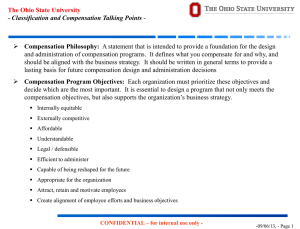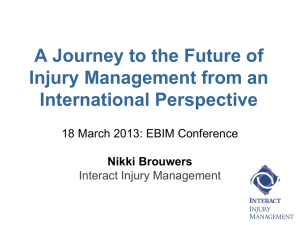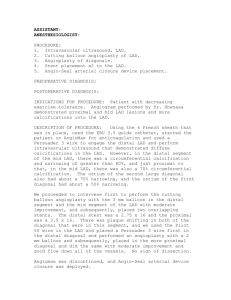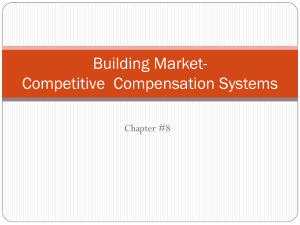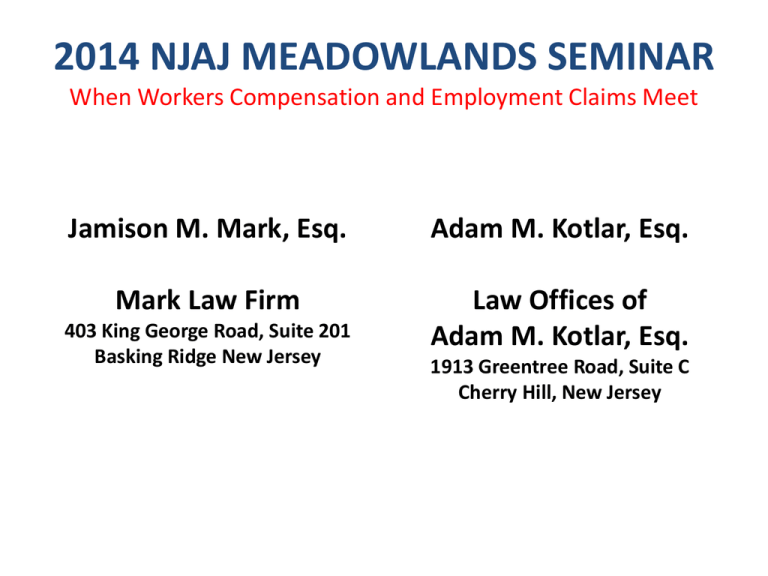
2014 NJAJ MEADOWLANDS SEMINAR
When Workers Compensation and Employment Claims Meet
Jamison M. Mark, Esq.
Adam M. Kotlar, Esq.
Mark Law Firm
Law Offices of
Adam M. Kotlar, Esq.
403 King George Road, Suite 201
Basking Ridge New Jersey
1913 Greentree Road, Suite C
Cherry Hill, New Jersey
What is Workers Compensation
• NJSA 34:15-1
• Social legislation giving up jury system for
prompt payment of benefits
• No Fault System
• Medical Treatment
• Temporary Total Wage Payments
• Permanent Partial or Total Disability
What is the N.J. LAD?
• NJSA 10:5-12 (New Jersey Law Against Discrimination)
Unlawful Employment actions to subject people to differential
treatment based on race, creed, color, national origin,
nationality, ancestry, age, sex (including pregnancy), familial
status, marital status, domestic partnership or civil union status,
affectional or sexual orientation, gender identity or expression,
atypical hereditary cellular or blood trait, genetic information,
liability for military service, and mental or physical disability,
perceived disability, and AIDS and HIV status.
• NJSA 10:5-5(q) Definition of Disability
How Does Workers Comp Work?
•
•
•
•
•
•
Work related injury / Occupational Exposure
Report to an Employer/Supervisor
Begin medical treatment
Temp Payments while under care / light duty
Curative/Restorative Treatment until MMI
Return to work may require Functional
Capacity Examination (FCE).
Statute of Limitations
• NJ LAD = 2 years
• WC Retaliation = 2 years
Section 40 Lien on Settlement
• NJSA 34:15-40: 3rd Party Lien on Settlement
3rd persons liability to employee for injury or death
Employer remains obligated to Employee
Recovery from 3rd person any sum obtained by injured employee
• What is the lien amount?
• When the gross third party settlement amount is equal to or greater
than the total award of compensation benefits, the amount of the
credit is generally two-thirds of the amount payable by or on behalf of
the employer less $750.00.
• When the gross third party settlement amount is less than the total
award of compensation benefits, the credit is generally two-thirds of
the gross third party settlement amount less $750.00.
WC “Disability ” or “Permanency” Claim
• Respondents (Employer) v. Petitioner (Employee)
• Injured Hands, Arms, Fingers, Legs, Foot, Eyes and
Ears – schedule based upon 600 weeks
• Determination of Permanency by Experts
• Percentage of Disability – Objective functional loss –
no pain / suffering
• Order Approving Settlement
• Dismissal with Settlement (Sect. 20)
PHYSICAL v. PSYCHIATRIC
WORKERS COMPENSATION CLAIMS
• While any type of injury is compensable, lets
review the big divide:
– Physical Injury
– Physical Injury with Psychiatric Overlay
– Purely Psychiatric Injury
Employment Psych v. Physical
• Emotional injuries – Always pled in LAD
• Physical injuries – Assault & Battery
• What about: “emotional injuries that are
accompanied by physical manifestations”
Psych Claim in WC Barred in LAD Claim?
•
Is there a Fear of Exclusive Remedy Bar?
•
NO FEAR! WC does not require your E.D. claim to be in WC jurisdiction!
•
NJSA 34:15-8: “If an injury or death is compensable under this Article, a person shall not be
liable to anyone at common law or otherwise on account of such injury or death for any act
or omission occurring while such person was in the same employ as the person injure or
killed, except for intentional wrong.” (I.E. THE LAD)
•
Millison v. E.I. duPont DeNemours & Co., 101 N.J. 161, 165 (1985), then Laidlow v. Hariton
Machinery Co., 790 A.2d 884 (N.J. 2002). Defined Intentional Wrongs
•
WC does not act as an intentional bar to the LAD. Khair v. Campbell Soup Company, No. Civ.
A.93-1626 , 1995 WL 366123 (D.N.J. June 12, 1995).
•
Tarr v. Ciasulli, 853 A.2d 921 (N.J. 2004). – E.D. inherent in LAD
•
But, what if you file an E.D. claim in WC as a Psych injury?
– GET IT OUT!
What is the WC Exclusive Remedy?
• You give up your rights to sue employer
• Applies only to “Negligent Conduct”
• Does Not apply to “Employer’s Intentional
Conduct”
LAD Disability & WC Injury
• Are they really one and the same?
• If you have a WC injury, may have a LAD
Disability?
• If you have an LAD Disability, not always a WC
injury
• Judge: “Hangnail can be a disability if it
prevents you from doing your job.”
Treatment & Accommodations
Of An Employee
• Interactive Process in a WC Case?
– Of course
• Evaluation by WC Doctors
• Functional Capacity Test
– To Go or Not to Go?
Termination while on leave!
– Can’t do the job, no accommodation necessary
Workers Compensation Retaliation
NJSA 34:39.1:
• Workers Compensation Act provides, in part:
• It shall be unlawful for any employer or his duly
authorized agent to discharge or in any other manner
discriminate against an employee as to their
employment because the employee has claimed or
attempted to claim Workers' Compensation benefits
from such employer.
• See Lally v. Copygraphics, 85 N.J. 668, 670–71, 428
A.2d 1317 (1981).
Proof Required for WC Retaliation
• To establish a prima facie case for retaliatory discharge under the
WCA, an employee must prove:
– (1) that he made or attempted to make a claim for workers' compensation;
and
– (2) that he was discharged in retaliation for making that claim.’ “
– Cerrachio v. Alden Leeds, 223 N.J.Super. 435, 442, 538 A.2d 1292
(App.Div.1988)
• Such retaliation may be shown, for example, by proof that an
employee who filed a compensation claim and then was discharged
had been queried by his supervisor about how his compensation
“cases” were going, and who later was told, “if you weren't such a
troublemaker you would still have a job here.” Cerracchio, supra,
223 N.J.Super. at 440, 443, 538 A.2d 1292.
WC DISCRIMINATION CLAIMS
CLAIMS USUALLY ARISE IN TWO SITUATIONS:
When there is temporal proximity between a decision to
discharge and a work-related injury; or temporal remoteness,
but an earlier expressed hostility to work related injuries, or
workers’ compensation benefits.
It is not necessary for the employee to have actually filed a
workers’ compensation claim, but rather it is enough for the
employee to simply have taken some action in furtherance of
his or her right to pursue workers’ compensation benefits.
See, Stewart v. County of Hudson, Morris v. Siemens
Components, Inc., 928 F.Supp. 486(D.N.J. 1996).
WC TERMINATION
• Evidence of filing or attempting to file a WC claim?
– What happens if an Employer sets up exams and
evaluations but an employee fails to show
– Employee fails to follow work rules or other procedures
which may, in and of itself, be considered the “final straw.”
• WC: Employee must show “Specific Evidence of
Intent.”
• Employer must then demonstrate termination was a
Legitimate Non-Discriminatory Reason
• Employee’s Burden of Proof
Definition of LAD Retaliation
• Pursuant to the LAD it is unlawful:
“[f]or an employer, because of the disability ... of any
individual, ... to discharge” such a person “unless
justified by lawful considerations[.]” N.J.S.A. 10:5–12.
The statute covers plaintiffs with actual or perceived
disabilities, and does not require a particular level of
severity for the disability to place the plaintiff in a
protected class.
See Andersen v. Exxon Co., U.S.A., 89 N.J. 483, 495, 446
A.2d 486 (1982).
Workers Compensation Filing Isn’t By
Itself Protected Activity Under LAD?
• A federal court recently held that a cashier who was
discharged one year after filing a workers’ compensation
claim failed to state a claim under the New Jersey Law
Against Discrimination (“LAD”) or the New Jersey
Conscientious Employee Protection Act (“CEPA”), holding
that filing a workers’ compensation claim is not considered
protected activity under either statute.
• filing a worker's compensation claim involves the pursuit of
benefits or wages by the employee. It does not involve an
employee opposing a discriminatory employment practice.
Davis v. SuperValu Inc., No. 13-414, 2013 U.S. Dist. LEXIS
56341 (D.N.J. Apr. 19, 2013).
CIVIL REMEDY
• Yes - Civil remedy in the nature of a tort claim
– Lally v. Copygraphics case
• Administrative cause of action – Hybrid
• Claims against Public Entity
– No NTC necessary (NJSA 59:1-5)
– Brook v. April, 294 N.J.Super 90 (1996)
Civil Remedy
• Damages based on discharge or termination following the claim,
or attempted claim, for workers’ benefits.
• In the ordinary course, the damages that flow from such a claim
includes restoration of position, back pay, and potentially
compensatory and punitive damages.
• Any employee so discriminated against shall be restored to his
employment and shall be compensated by his employer for any loss of
wages arising out of such discrimination; provided, if such employee
shall cease to be qualified to perform the duties of his employment he
shall not be entitled to such restoration and compensation.
• Though not often utilized, the statute also provides for a civil
penalty which may be imposed by the state.
WC Aiding & Abetting / Fraud
• WC Insurance Adjuster & Employer
• Adjuster knowingly and substantially assisted
employer in discrimination against Employee
• Any person makes a false or misleading
statement to evade full payment of benefits.
N.J.S.A. 34:15-57.4
FINAL WORD
• Plead under the correct statute!
• Know the difference between LAD (NJSA 10:51) and NJ WC (NSJA 34:15-1).


